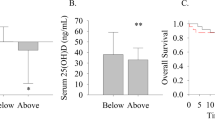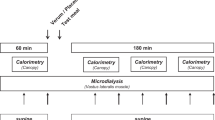Abstract
Plasma and buffy-coat vitamin C were estimated in 158 samples from 139 lung-cancer patients, at all stages of the disease. Most samples showed hypovitaminosis C in both estimations: 64% had plasma, and 25% buffy-coat values below the thresholds for incipient clinical scurvy (0.3 mg% and 10 micrograms/10(8) cells respectively). Levels were diet-dependent and could be increased by oral supplements. Levels were low both in tumour-bearing patients and in those clinically free of disease after resection. The latter had particularly low values during the first 6 months, indicating the utilization of vitamin C in surgical repair. The vitamin C content of 13 primary lung tumours was assayed: tumours had a higher vitamin C content (mean 111.6 +/- 55.1 micrograms/g tissue) than normal lung (58.5 +/- 20.4 micrograms/g). Mononuclear cells from normal individuals show a higher vitamin C content than polymorphs, but in lung-cancer patients the expected correlation of buffy-coat vitamin C with the proportion of lymphocytes in peripheral blood was obscured by an inverse correlation in patients with relative lymphocytosis (greater than or equal to 25% lymphocytes), confirmed by an inverse correlation of the proportion of lymphocytes in peripheral blood with mononuclear-cell vitamin C in 14 patients in whom this was measured. These correlations were unaffected by controlling for plasma values, and indicate the utilization of vitamin C in lymphocyte-related anti-tumour mechanisms. Vitamin C is necessary for phagocytosis and for the expression of cell-mediated immunity. In view of the increasing circumstantial evidence that immune mechanisms exert some measure of control on tumour extension and metastasis in man, the effect of supplementation with vitamin C in lung-cancer patients on survival should be tested in a clinical trial.
This is a preview of subscription content, access via your institution
Access options
Subscribe to this journal
Receive 24 print issues and online access
$259.00 per year
only $10.79 per issue
Buy this article
- Purchase on Springer Link
- Instant access to full article PDF
Prices may be subject to local taxes which are calculated during checkout
Similar content being viewed by others
Rights and permissions
About this article
Cite this article
Anthony, H., Schorah, C. Severe hypovitaminosis C in lung-cancer patients: the utilization of vitamin C in surgical repair and lymphocyte-related host resistance. Br J Cancer 46, 354–367 (1982). https://doi.org/10.1038/bjc.1982.211
Issue Date:
DOI: https://doi.org/10.1038/bjc.1982.211
This article is cited by
Expression of hypoxia inducible factor 1α and 2α and its association with vitamin C level in thyroid lesions
Journal of Biomedical Science (2017)
The epigenetic role of vitamin C in health and disease
Cellular and Molecular Life Sciences (2016)
A simple method for plasma total vitamin C analysis suitable for routine clinical laboratory use
Nutrition Journal (2015)
Appropriate vitamin D loading regimen for patients with advanced lung cancer
Nutrition Journal (2015)
Intravenous ascorbic acid as an adjuvant to interleukin-2 immunotherapy
Journal of Translational Medicine (2014)



